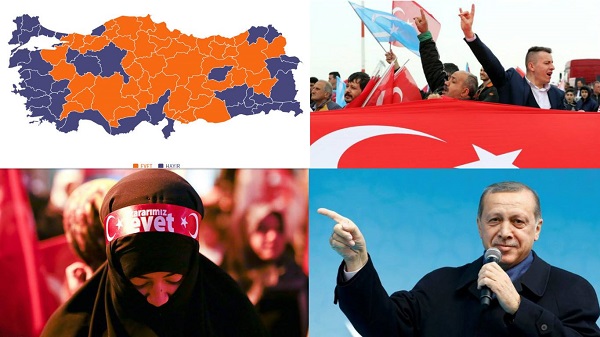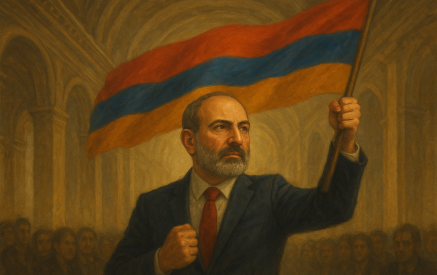Constitutional Referendum in Turkey: not only voice slit, but the country divided and polarized as well
Turkey voted in favor of the Constitution proposed by President Erdogan due to a slight advantage – ratio of 51/49. In fact, not only the votes are divided, those exact devisor lines pass across the map of the country.
Erdogan was denied by the biggest cities of the country – Istanbul, Ankara, Izmir, Adana, Antalya, Kurdish-resided provinces in exception two of them, Aegean and Mediterranean coastal provinces, provinces bordering Armenia and Georgia, Kars excluded, where “Yes” has received solely 50.99%.
The negligible advantage in favor of Erdogan was provided by the “nuclear” electorate in Anatolia. It is remarkable as well that in few provinces and cities the votes have been divided at place, such as in Istanbul and Ankara, the distinctly oriented provinces are more in number, where either “Yes” or “No” has received approximately the two third of the votes. Thus, merely 60-65% of Kurdish-resided regions (Diyarbakir, Van) have said “No”, the 68% of Izmir has said “No”. Similarly in the case of “Yes”. Therefore, only about 73% of Konya has voted for, nearly 1 million people, or nationalist Erzurum – 74.5%. Impressive is the picture in Istanbul, where 9 million votes, as throughout the whole country, have divided, 51.3% has said “No”. Here as well the regions and districts are precisely oriented. In “Old city” the defeat of Erdogan is simply overwhelming. In Shishli 71.7% has voted against and in Beshiktash 82.8%, meanwhile the reverse picture prevails in Sultangazi or Sultanbeyli districts: “Yes” possesses almost the same percentage.
Read also
We should note that official data are taken into account, on the litigation of which Erdogan’s opponents have already announced. Besides, the state of emergency declared previously proceeds and the authorities have created systemic obstacles to “No” propaganda throughout the whole course of the campaigns. OSCE Office for Democratic Institutions and Human Rights Director Michael Link has announced in the interview to “Deutsche Welle” that former election violations took place mainly in Kurdish-resided regions, the current referendum takes place in emergency conditions and the election fraud will spread through the whole country. Turkey has become world record-holder by the number of its imprisoned journalists.
One thing is apparent, that the watershed within the country is not only and not that much political as civilizational. This is an attitude towards the secular orders, sustaining leader-worshipism, person-state relations. It is evident as well that the worldviews diametrically opposite to each other predetermine also the external political preferences and attitude towards the West.
It is a fact that Ataturk’s Turkey transformation is over and it is not plain what Erdogan, having received limitless power until 2029 will do to his power. Turkey-West relations are and will be of a vital importance to Ankara, they cover fields of both security and economy. And as the economic growth is provided, Ankara will endeavor to continue to tackle the most by virtue of its multi-vector game. However, several intentions cannot leave Erdogan’s regime careless.
Tourism in Turkey degrades: if in 2014 the country had 42 million foreign tourists, then two years later that number decreased down to 25 million. Because of various limitations, a set of worldwide brands leave the country, the unemployment increases, the continuation of the Western investments which brings not solely money but technology and modernization to the country is under threat. Eventually, it is difficult to expect investment from those who you call “Nazi” or remind how you have “thrown some of them into the sea” in 1922 together with their “protectors”.
It is also difficult to expect investments in a country where the ideology of “occupied fortress” is propagated for years, as in Putin’s Russia. And if according to the Russian “traditional” mentality Moscow possesses “two allies solely” – the army and the navy, Turkish “traditional” mentality entails that “Turk has merely one ally – Turk himself”. And the Turkish paradox implies that from one side the victory essentially decreases the significance of populism, the very populism, which mastering, Erdogan “saddled” Turkey, which objectively increases Ankara’s predictability. Nevertheless, inasmuch as it is not clear what Erdogan will do with his victory in a split country to please everyone, it increases the risks that that victory may convert into Pyrrhonian after some time with all its existential consequences, when not only the Syrian and Kurdish challenges are not overcome, but also manifest a distinct tendency to aggravate.
There are no grounds to expect for dramatic incidents in Turkey to change anything with reference to inter-state relations with Armenia, in Ankara’s position. However, extremely dynamic developments particularly require Armenia – both the state and the public – first and foremost to keep all that takes place in the neighbor country under focus. The incidents in Turkey, their possible developments have been and remain under the attention of the public sector of ours which possesses state thinking and sense of politics, and gives importance to the following: the perception and formulation of Armenia’s interest on the platform of Armenia-Turkey intergovernmental relations require view from Yerevan exceptionally. A question remains unanswered – whether official Yerevan possesses tools in its national security “armory” and is ready to utilize them by its own decision if a somewhat situation shift dictates and whether all necessary lessons have been drawn out from the procedure of the failed inscriptions, when the conception was correct, but the implementation – initially erroneous. A thing is apparent: it is not going to be easy.
RUBEN MEHRABYAN



























































